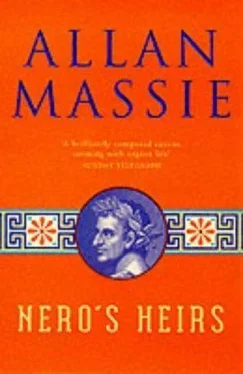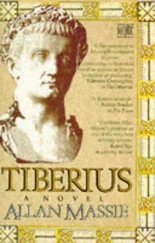Allan Massie - Nero_s Heirs
Здесь есть возможность читать онлайн «Allan Massie - Nero_s Heirs» весь текст электронной книги совершенно бесплатно (целиком полную версию без сокращений). В некоторых случаях можно слушать аудио, скачать через торрент в формате fb2 и присутствует краткое содержание. Жанр: Исторические приключения, на английском языке. Описание произведения, (предисловие) а так же отзывы посетителей доступны на портале библиотеки ЛибКат.
- Название:Nero_s Heirs
- Автор:
- Жанр:
- Год:неизвестен
- ISBN:нет данных
- Рейтинг книги:3 / 5. Голосов: 1
-
Избранное:Добавить в избранное
- Отзывы:
-
Ваша оценка:
- 60
- 1
- 2
- 3
- 4
- 5
Nero_s Heirs: краткое содержание, описание и аннотация
Предлагаем к чтению аннотацию, описание, краткое содержание или предисловие (зависит от того, что написал сам автор книги «Nero_s Heirs»). Если вы не нашли необходимую информацию о книге — напишите в комментариях, мы постараемся отыскать её.
Nero_s Heirs — читать онлайн бесплатно полную книгу (весь текст) целиком
Ниже представлен текст книги, разбитый по страницам. Система сохранения места последней прочитанной страницы, позволяет с удобством читать онлайн бесплатно книгу «Nero_s Heirs», без необходимости каждый раз заново искать на чём Вы остановились. Поставьте закладку, и сможете в любой момент перейти на страницу, на которой закончили чтение.
Интервал:
Закладка:
Galba toadied up to the Augusta, Livia, when he was a young man and I believe she left him something in her will. Some say it was to please her that, when he was aedile in charge of the Games, he introduced the novelty of elephants walking a tightrope. That's ridiculous; Livia Augusta was never amused by such nonsenses.
He had a long career of public service, and didn't do badly, but never so well as to arouse the jealousy of emperors. That he survived both Gaius Caligula and Nero is to my mind evidence of his essential mediocrity. But he liked to pose as a disciplinarian of the old school. For instance, when he was Governor in Spain he crucified a Roman citizen who was said to have poisoned his ward, even though the evidence was provided by people who had an interest in the man's conviction. He didn't respond to pleas that it was wrong to crucify a citizen, except by commanding the cross to be taller than other crosses and white-washed to make it still more conspicuous.
Galba married only once. He disliked his wife, who was also named Livia, as I recall, and ignored his sons, showing no emotion when they died young. But, hypocrite that he was, he gave the love he had borne his dead wife as the reason why he never married again. Actually, he had no taste for women, nor indeed for boys, but only for mature men. Since everyone despises the man who, though an adult, takes the part of the woman in bed, he concealed this taste as best he could till he became Emperor. Then he was so excited when news was brought him of Nero's death that he seized hold of his freedman Icelus, a handsome swarthy brute, slobbered kisses over him, and told him to undress at once and pleasure him. I wonder what Tacitus will make of that story. Nothing, I dare say.
IX
It was, all the same, my dear Tacitus, whatever you might like to think, with apprehension that we awaited Galba's arrival in the capital. Word came that his advance was slow and blood-stained. Those suspected of being less than enthusiastic for his elevation were, as the saying went, 'eliminated'. Varro, Consul elect, and Petronius Turpilianus, a man of consular rank, were both put to death, without trial. Or so we heard.
Then the Praetorians were agitated. They already regretted Nero who had treated them so indulgently. Their prefect Nymphidius saw in their mood his opportunity to strike for Empire. He made sure that they learned of Galba's response to their demand for the customary donative: 'I choose my soldiers; I do not buy them.' Domitian said to me: What a fool the old man must be; generals have had to buy their troops since Pompey's day. I know enough history to know that, even if I don't bury my nose in the stuff as you do. Tiberius alone could express such sentiments and survive them. But then Tiberius was a great general, which Galba isn't, and a man of matchless authority.' This wasn't the first time I had heard Domitian speak admiringly of that Emperor, on whom, as you know, he was to brood long and lovingly in years to come. Old-style Republicans (of your stamp, my dear) purred as they approvingly repeated what they termed 'Galba's most noble sentiments', which certainly inspired Nymphidius to promote a mutiny. For a couple of days he was master of the city; Flavius Sabinus told his nephew Domitian that for those hours he went in fear of death, even though Nymphidius was his cousin.
But then word came that Galba's troops were within a day's march of Rome. Those of the Praetorians who had lent an ear to their prefect's seduction now felt panic. For all their reputation, few of them had any recent experience of war, and all disliked its imminent reality. When Nymphidius entered the camp to harangue them, they shouted him down. He withdrew in alarm, followed by a hail of oaths and missiles. I saw him white-faced and trembling, jostled by crowds as he made his way through the Forum towards his own house where he hoped to find refuge. He did not attain it. A troop of cavalry, either Galba's advance-runners or specially commissioned by Republican senators -no one knew which, then or later – forced their way through the mob, which itself parted and then fled in terror, and cut him down. They dragged his body to the Tarpeian Rock and hurled it, already lifeless, over; a purely symbolic enaction of the age-old penalty suffered by traitors. It lay at the foot of the rock till nightfall, no one daring to remove it.
By afternoon the Forum was deserted. It was a grey winter day and fear hung heavy as frost. I was unable to return across the river; detachments of soldiers, under whose command, if any, no one could tell, were to be seen at street corners and also at the bridges. The poor wretches were doubtless as confused as the mass of citizens. But in their confusion they were dangerous. You could not guess what they might take exception to, whom they might turn on in their own fear. I withdrew, hoping merely that my mother had kept to our apartment. So, by narrow lanes and a careful circuitous route, I made my way to the house in the Street of the Pomegranates where Domitian and Domatilla lodged with their aunt. I was happy to find all safe, but, though Domatilla looked on me with eyes of tender love, we did not dare embrace in the presence of others. It was hard, in my agitated mood, to be with her, and forbidden to touch her flesh, hold her in my arms, feel her lips against mine, and be restored in the shelter of our love. Domitian sat by the window, at an angle to it, able to look out, and believing he could not himself be observed from the street. He drank wine and bit his fingernails. I told them what I had seen in the city, from which the winter light was now being quickly withdrawn. Domitian spoke out to prevent his aunt from lighting the lamps. It was, he said, safer to sit in the dark. 'But why should we be endangered?' the aunt asked.
There was no answer to that, for there was no reason why we in particular, people of no position then, three of us young and the fourth an old woman given to good works and the practice of religion, should know fear. Yet we did.
When it was quite dark, there were steps on the staircase and a knocking at the door, which Domitian had shut with triple bolts after my entrance. He made signs in the gloom that we should not respond, but then a voice spoke, announcing that it was their uncle Flavius Sabinus.
He had come alone, without slaves or any of the soldiers whom he had at his command. Though he would not say that he sought refuge, that, I even then had no doubt, was his purpose in coming to his sister's house. He might be in no danger. But, as a public man in a responsible position, he feared he was; and preferred to withdraw himself from sight till the situation, whatever it might be, had resolved itself.
It embarrassed him that he could not tell us what was happening. All he would say was, 'I warned Nymphidius that the Praetorians would desert him. To whom have they ever been faithful?' We sat wakeful through the night. My own feelings were confused, disturbed. One moment I knew the infection of Flavius' fears, the next, catching sight of the girl's profile or feeling the gentle pressure of her breasts as she leaned over me to look out of the window, I was seized with near intolerable lust. Is there, I ask you, in the autumn of life anything which sets the nerves throbbing more smartly than summoning up memories of youthful desire? Summoning up is not the right expression; they rise unbidden as urgent dreams. Que de souvenirs, que de regrets, as the Greeks say.
Galba entered the city the following day. Without hesitation he revenged himself on those troops which had not openly and immediately done obeisance to him. When some marines whom Nero had armed hesitated to obey an order to return to the galleys, Galba ordered his Spanish cavalry to charge into the protesting mob of men. They were then rounded up, lined against a wall, and every tenth man cut down. This was, as Galba's supporters announced, evidence of his antique virtue. 'Decimation is an old Republican measure,' they said, nodding their heads.
Читать дальшеИнтервал:
Закладка:
Похожие книги на «Nero_s Heirs»
Представляем Вашему вниманию похожие книги на «Nero_s Heirs» списком для выбора. Мы отобрали схожую по названию и смыслу литературу в надежде предоставить читателям больше вариантов отыскать новые, интересные, ещё непрочитанные произведения.
Обсуждение, отзывы о книге «Nero_s Heirs» и просто собственные мнения читателей. Оставьте ваши комментарии, напишите, что Вы думаете о произведении, его смысле или главных героях. Укажите что конкретно понравилось, а что нет, и почему Вы так считаете.












